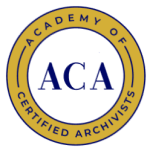Encouragement from a New Member
By Sharon Perry Martin
Originally published in “ACA News,” March/April 1999.
I became a certified archivist in September 1998, having taken the examination despite mixed feelings about certification. I obtained a professional archivist position without it; and if I planned to move on, my experience and professional activities would enhance my resume. Therefore, if certification was not required to enter the archival profession, it was certainly not necessary to remain in the field.
After working in the profession for a few years, my views about certification began to change. An increasing number of positions list certification as a preferred qualification. I thought that perhaps I should add certification to my professional achievements. More importantly, I thought that taking the certification examination could be a self-assessment measurement. Could I join the ranks of those archivists who, either by examination or petition, had achieved “certified” status? This became the deciding factor for me to work toward certification.
I ordered the Handbook for Archival Certification and began to prepare intensely. I reread some of the SAA Basic Manual Series, with plans to read all of them before September. I also read some of the other classics suggested in the handbook. I studied with a partner, and we prepared outlines for some of the domains. I was determined to ace the examination. I soon began to realize that this was defeating my primary purpose for seeking certification; I wanted to determine how competent an archivist I was. By preparing so diligently, certification would only be a measure of how quickly I could force myself to learn massive amounts of information. After taking graduate level archives courses and working in the profession for a few years, I should know most of what the examination would cover. So after a month of this intense preparation, I stopped studying so hard.
The examination was not particularly difficult. The questions were realistic and reflected situations that often arise in the everyday work environment. For example, all of the answer choices for the questions were partially correct, but one would be more correct according to proper standards and procedures in an ideal situation. The handbook calls these answer choices “distractors”. I seldom find myself in an ideal situation and often have to make compromising decisions that fit the needs and resources of my facility. Taking the examination and sorting out the most correct answer reminded me that I do know what the standards are and should try to work toward them, even with the distractions of real life!
When my results came, I was pleasantly surprised. I had passed the examination, but that was not what surprised me. The Academy furnishes scores in a breakdown by domain, and my scores mirrored my daily work situation. For example, I scored well in the Reference Services and Access to Documents domain. I work in a special collections division of a large public library; and one of my biggest challenges is to make our collections accessible for patrons to use and for staff members to locate. Surprisingly, I scored best in the Professional, Ethical and Legal Responsibilities domain. This is the area of my job wherein I tend to be the most careful and unsure of myself, so I was encouraged about answering nine out of ten of those questions correctly. The areas I scored the lowest are those to which I am not exposed or work in the least. I am not a manager and seldom make management decisions; and accordingly, I scored lowest in this domain. I suffer from the common archival dilemma of wanting to accept most of the collections offered to us and wanting to keep most of what is in these collections, and my score in the Selection of Documents domain reflected that.
Seeing where both my strengths and weaknesses lay will help me plan my continuing education and my future work performance. I am seeking out workshops that focus on management issues, as I do hope to promote to a management position in the future. I am reading examples of collection development policies as well as some of the suggested readings in this area, hoping to both create and adhere to a formal policy.
Overall, I am glad that I took the examination. Certification has impacted how I feel about my career. I am part of a unique profession that requires specialized skills, and I have reached a certain level of competency in this profession. My main reason for certifying was to ascertain whether or not I attained that competency, and I can certainly say that this task was accomplished.
